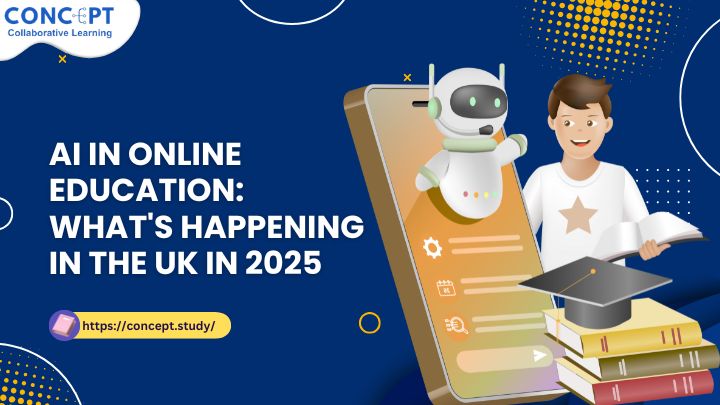
Introduction: The AI Revolution in UK Education
Artificial Intelligence (AI) is no longer a futuristic concept in UK classrooms – it’s already here, and it’s transforming the face of online education in 2025. From virtual tutors and automated assessments to inclusive language tools and curriculum personalisation, AI is playing a pivotal role in how education is delivered, accessed, and experienced across the country.
How AI Is Reshaping Online Classrooms
From Passive to Interactive Learning
Gone are the days of static online lessons. AI is turning traditional video lectures and reading materials into dynamic, responsive learning experiences. Tools such as AI chatbots, adaptive quizzes, and gamified simulations enable students to interact with content in real time, ask questions, and receive instant feedback. This interactivity not only boosts engagement but also improves knowledge retention.
AI Tutors and Personalised Learning Paths
One of the most transformative features of AI in education is its ability to offer personalised learning. AI algorithms analyse a student’s learning style, pace, strengths, and weaknesses to create custom-tailored study paths. This allows students to master concepts at their own pace, while receiving recommendations for revision, practice, or enrichment.
The Rise of Intelligent Learning Platforms
Data-Driven Curriculum Design
AI platforms collect and analyse vast amounts of data on student performance. This data is then used to fine-tune course content, ensuring that it remains relevant, effective, and aligned with curriculum standards. Teachers can also use these insights to identify topics where students struggle and intervene proactively. What Is Place Value?
Smart Assessment and Feedback Tools
AI now plays a key role in assessments, grading, and feedback. From multiple-choice quizzes to essay marking, intelligent algorithms can evaluate student work quickly and consistently. More importantly, these systems provide real-time feedback with actionable suggestions, helping students improve continuously.
Advanced systems even detect plagiarism and assess creativity and originality in written work – features previously limited to human teachers.
AI for Inclusivity: Breaking Learning Barriers
AI Tools for SEN (Special Educational Needs) Students
In 2025, AI tools will actively reduce learning inequalities. For students with dyslexia, ADHD, autism, or physical impairments, AI offers custom accessibility options, such as text-to-speech, speech-to-text, predictive typing, and emotion recognition tools, that adapt to the learner’s needs. How to Solve Integration Problems
Example: AI-powered platforms like Otter.ai provide real-time transcriptions for students with hearing impairments, while Glean supports note-taking for those with attention difficulties.
UK Government’s Policy and Investment in EdTech 2025
Major Grants and Support Schemes
The UK Government, through the Department for Education (DfE), continues to back EdTech initiatives. In 2025, funding has been increased for AI-based pilot programmes, especially in underserved and rural areas. Government-backed partnerships with private tech firms are promoting innovation while ensuring equity in access.

AI Regulatory Framework in UK Schools
To ensure safe and ethical use of AI, the UK has rolled out a regulatory framework focusing on:
- Student data protection
- Algorithm transparency
- Bias mitigation in AI assessments
AI in Higher Education: A Student’s Perspective
University-Level AI Integration
Higher education institutions across the UK, including Russell Group universities, have embraced AI for course delivery, student support, and research. AI supports everything from automated grading in STEM subjects to personalised dissertation feedback. It also enhances virtual labs and simulation-based learning in fields like medicine and engineering.
The Role of AI in Career Readiness
AI is also helping students prepare for the real world. Career counselling bots analyse student profiles and recommend suitable jobs, internships, or postgraduate programmes. Mock interviews and resume checks powered by AI are now standard features in university career services. Connect with Concept.Study for affordable Online Tutoring UK
The Role of Teachers in an AI-Supported World
Upskilling Educators for AI Literacy
Professional development is key. The DfE and private training institutes now offer CPD-certified courses on AI literacy, helping teachers understand, use, and teach with AI tools effectively. AI fluency is becoming a required skill in the modern classroom.
Human Touch in AI-led Classrooms
While AI brings efficiency and customisation, human empathy, encouragement, and moral guidance are still essential. The best outcomes are seen when AI supports teachers — not replaces them.
Integration with LMS & Virtual Classrooms
AI platforms now plug directly into Learning Management Systems like Moodle, Google Classroom, and Microsoft Teams, offering seamless integration with online lessons, assignments, grading, and reports.
Case Study: AI Implementation in a London School
Brixton Academy, a secondary school in South London, piloted an AI learning assistant in 2024. Within one academic year:
- Homework completion increased by 32%
- SEN students reported a 45% increase in understanding
- Teachers saved over 6 hours/week on marking
The success led to school-wide implementation and became a model for other academies in the borough.
Conclusion: The Future of AI in UK Education
In 2025, the UK is at the forefront of integrating AI into online education. While challenges remain, the benefits — including personalisation, inclusivity, efficiency, and innovation — far outweigh the concerns when implemented responsibly.
FAQs
1. How is AI used in UK classrooms in 2025?
AI is used for personalised learning, automated assessments, accessibility tools for SEN students, and virtual tutoring. It enhances engagement and reduces teacher workload.
2. Are teachers being replaced by AI?
No. AI complements teachers by handling repetitive tasks, allowing them to focus on mentorship and emotional support.
3. Is AI safe for students?
When implemented with proper data protection and transparency, AI tools are safe and beneficial. UK schools follow strict regulatory frameworks.
4. Can AI help children with learning difficulties?
Yes. AI tools provide tailored support for students with dyslexia, ADHD, and other learning needs through features like text-to-speech and adaptive content.
5. What AI platforms are most popular in the UK?
Popular platforms include Century Tech, Duolingo Max, Squirrel AI, and Otter.ai, all offering personalised and inclusive learning experiences.
6. Will AI reduce education inequality in the UK?
AI has the potential to level the playing field by offering high-quality, affordable learning tools to students in remote or underserved areas.
